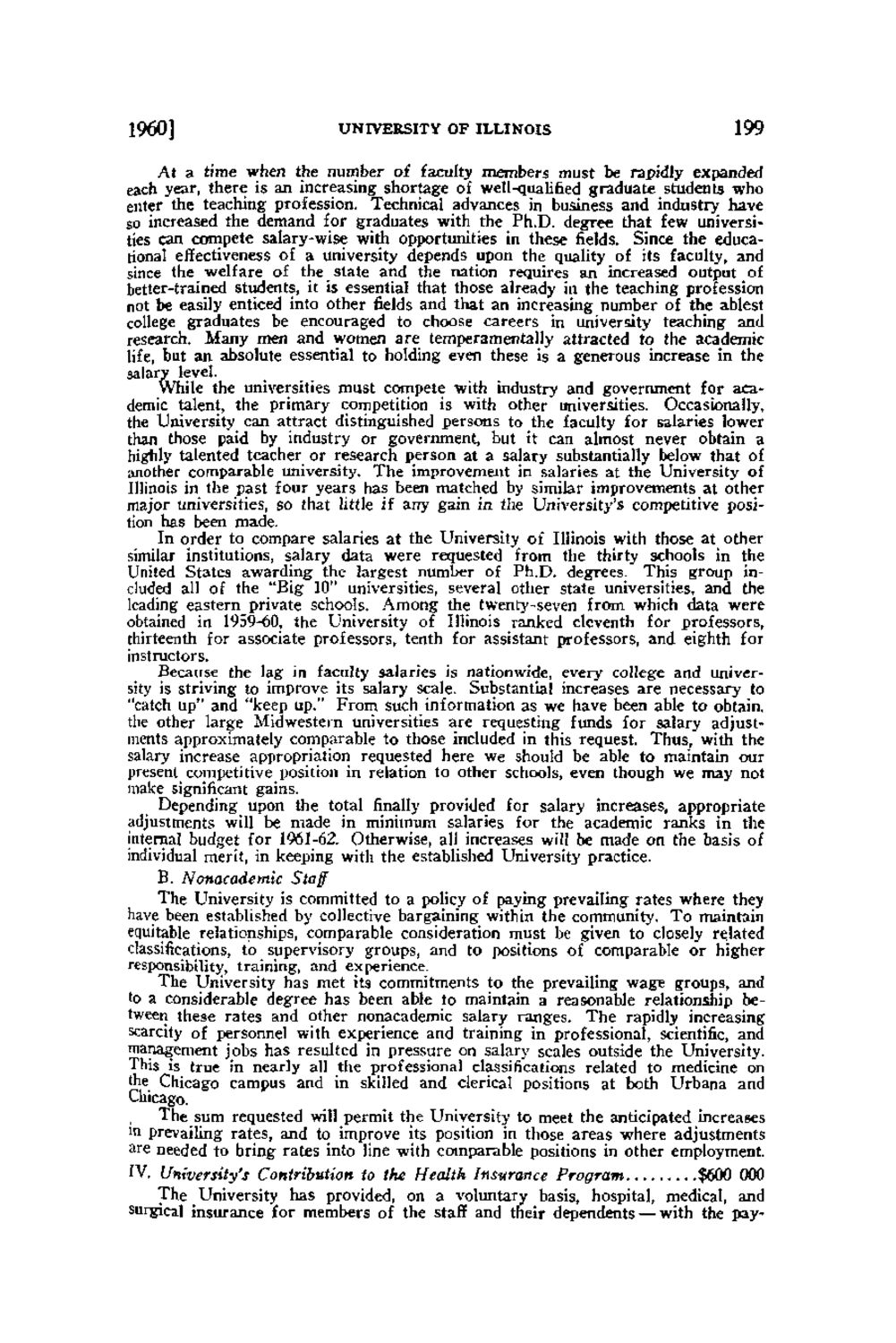| |
| |
Caption: Board of Trustees Minutes - 1962
This is a reduced-resolution page image for fast online browsing.

EXTRACTED TEXT FROM PAGE:
1960] UNIVERSITY OF ILLINOIS 199 At a time when the number of faculty members must be rapidly expanded each year, there is an increasing shortage of well-qualified graduate students who enter the teaching profession. Technical advances in business and industry have so increased the demand for graduates with the Ph.D. degree that few universities can compete salary-wise with opportunities in these fields. Since the educational effectiveness of a university depends upon the quality of its faculty, and since the welfare of the state and the nation requires an increased output of better-trained students, it is essential that those already in the teaching profession not be easily enticed into other fields and that an increasing number of the ablest college graduates be encouraged to choose careers in university teaching and research. Many men and women are temperamentally attracted to the academic life, but an absolute essential to holding even these is a generous increase in the salary level. While the universities must compete with industry and government for academic talent, the primary competition is with other universities. Occasionally, the University can attract distinguished persons to the faculty for salaries lower than those paid by industry or government, but it can almost never obtain a highly talented teacher or research person at a sajary substantially below that of another comparable university. The improvement in salaries at the University of Illinois in the past four years has been matched by similar improvements at other major universities, so that little if any gain i/i the University's competitive position has been made. In order to compare salaries at the University of Illinois with those at other similar institutions, salary data were requested from the thirty schools in the United States awarding the largest number of Ph.D. degrees. This group included all of the "Big 10" universities, several other state universities, and the leading eastern private schools. Among the twenty-seven from which data were obtained in 1959-60, the University of Illinois ranked eleventh for professors, thirteenth for associate professors, tenth for assistant professors, and eighth for instructors. Because the lag in faculty salaries is nationwide, every college and university is striving to improve its salary scale. Substantial increases are necessary to "catch up" and "keep up," From such information as we have been able to obtain, the other large Midwestern universities are requesting funds for salary adjustments approximately comparable to those included in this request. Thus, with the salary increase appropriation requested here we should be able to maintain our present competitive position in relation to other schools, even though we may not make significant gains. Depending upon the total finally provided for salary increases, appropriate adjustments will be made in minimum salaries for the academic ranks in the internal budget for 1961-62. Otherwise, all increases will be made on the basis of individual merit, in keeping with the established University practice. B. Nonacademk Staff The University is committed to a policy of paying prevailing rates where they have been established by collective bargaining within the community. To maintain equitable relationships, comparable consideration must be given to closely related classifications, to supervisory groups, and to positions of comparable or higher responsibility, training, and experience. The University has met its commitments to the prevailing wage groups, and to a considerable degree has been able to maintain a reasonable relationship between these rates and other nonacademic salary ranges. The rapidly increasing scarcity of personnel with experience and training in professional, scientific, and management jobs has resulted in pressure on salarv scales outside the University. This _is true In nearly all the professional classifications related to medicine on the Chicago campus and in skilled and clerical positions at both Urbana and Chicago. The sum requested will permit the University to meet the anticipated increases in prevailing rates, and to improve its position in those areas where adjustments are needed to bring rates into line with comparable positions in other employment. IV, University's Contribution to the Health Insurance Program $600 000 The University has provided, on a voluntary basis, hospital, medical, and surgical insurance for members of the staff and their dependents — with the pay-
| |